PALOP
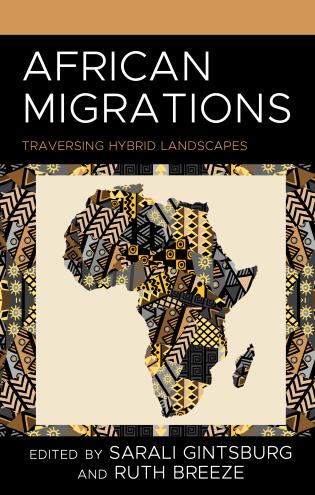
From Angola to Portugal: Narrating Migration, Memory and Identity in Djaimilia Pereira de Almeida’s Work
Abstract:
Based on the teoretichal perspetives of Lusophone Postcolonial Studies, in dialogue with other analytic tools from Feminist Studies, this chapter aims to explore the topics of migration, memory and identity through the close reading of two works of fiction by the Portuguese writer of African descent Djaimilia Pereira de Almeida (1982), who was born in Angola and grew up in Portugal. In the autofiction That Hair (Tin House, 2020; originally published in Portuguese as Esse Cabelo, 2015), as well as in the novel Lisbon, Luanda, Paradise (Lisboa, Luanda, Paraíso, 2018), the main characters move from Angola to Portugal for personal or family reasons and seek to redefine their identities. They give voice to memories and narratives that involve the relationships between the colonial past and the building of contemporary postcolonial identities. In particular, the chapter analyses the representation of both the place of orign and arrival to portray the complex socio-cultural and migratory identity landscapes that emerged during Portuguese colonialism, as well as following the decolonization in Lusophone Africa (1975). In this regard, incluiding also a brief reading of the most recent novel by Almeida, Maremoto (2018), the chapter pays special attention to the perceptions and experiences of the city of Lisbon by narrators and protagonists who are immigrants, in order to reflect on the contemporary configurations of a postcolonial city on the periphery of Europe.
Citation:
Falconi, Jessica (2024) “From Angola to Portugal: Narrating Migration, Memory and Identity in Djaimilia Pereira de Almeida’s Work” in S. Gintsburg & R. Breeze (eds) Afriacan Migration: Traversing Hybrid Landscapes. Lanham: Lexington Books, p. 15-35.
https://rowman.com/ISBN/9781666938708/African-Migrations-Traversing-Hybrid-Landscapes
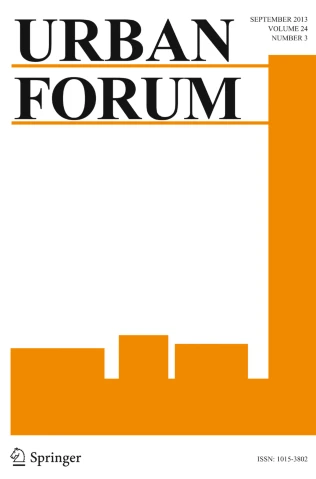
Armed Conflict and Urbanization in Cabo Delgado, Mozambique: A methodology for a critical inquiry
Abstract:
Mainstream urban theory fails to encompass urbanization in Africa. Among its many drivers, armed conflicts displace rural populations to cities, accelerating urban processes and impacting sustainability and governance — the phenomenon of conflict-induced urbanization. In the province of Cabo Delgado, a violent insurgency has been displacing thousands of civilians since 2017; many of whom have fled to the provincial capital Pemba, doubling its population in just 5 years. This article presents the theoretical framework and methodological design for an inquiry located within a contemporary critique of mainstream urban studies; the goal is to analyse conflict-induced urbanization in Pemba with a comparative case study, using participatory visual methods, for which a pilot study took place in September 2022. With this, the author aims to contribute to engaged urban studies in Mozambique and Portugal and to transform the trauma of war into opportunities for sustainable development and prosperity.
Cite this article:
Agostinho do Amaral, S. Armed Conflict and Urbanization in Cabo Delgado, Mozambique: A Methodology for a Critical Inquiry. Urban Forum (2023). https://doi.org/10.1007/s12132-023-09505-y
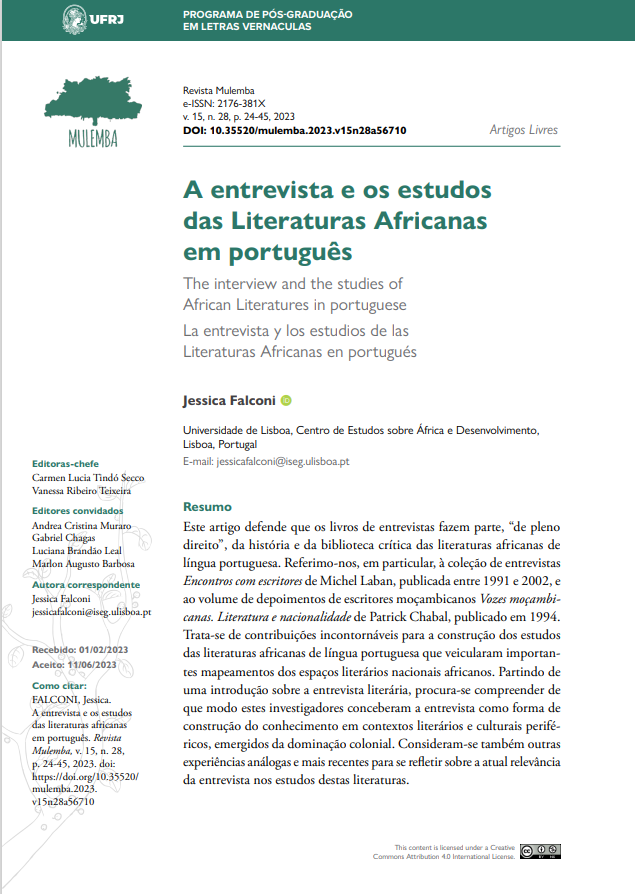
A Entrevista e os Estudos das Literaturas Africanas em Português
Abstract:
This article argues that interview books are a “full right” part of the history and critical library of Portuguese-language African literature. We refer, in particular, to the collection of interviews “Encontros com Escritores” by Michel Laban, published between 1991 and 2002, and the volume of testimonies by Mozambican writers “Vozes Mozambicanas. Literature and nationality by Patrick Chabal”, published in 1994. These are unavoidable contributions to the construction of studies of Portuguese-language African literatures that conveyed important mappings of African national literary spaces. Starting from an introduction to the literary interview, we seek to understand how these researchers conceived the interview as a way of building knowledge in peripheral literary and cultural contexts, emerging from colonial domination. Other similar and more recent experiences are also considered to reflect on the current relevance of interviews in studies of these literatures.
Quotation:
FALCONI, J. A entrevista e os estudos das literaturas africanas em português. Revista Mulemba, v. 15, n. 28, p. 24-45, 2023. doi: https://doi.org/10.35520/mulemba.2023.v15n28a56710

História de São Tomé e Príncipe de Meados do Século XIX ao Fim do Regime Colonial (1852-1974): As plantações, economia, cultura e religião
Abstract:
This book explains the reasons that led the Portuguese to recolonize the São Tomé and Príncipe islands from 1852 onwards and the strategies they adopted to institutionalize the new colonial order in the archipelago. They removed the natives from ownership of land and institutions and introduced the plantation economy model around which all economic and social life began to revolve, with the territory being divided between the populations of large plantations and the native populations. Work and land were exploited to the point of exhaustion, with mistreatment, racial discrimination, and a progressive decline in soil productivity. The production crisis emerged and exposed the limits of the plantation economy model. There were several attempts to forcefully hire native labor, which generated many conflicts and led to the “Batepá” massacre of 1953. This event raised the awareness of nationalists for the independence of the archipelago, which occurred on July 12, 1975. The book also addresses culture and religion as central elements that shape São Tomé and Príncipe society and identity.
Quotation:
Espírito Santo, A. (2023). História de São Tomé e Príncipe – De Meados do Século XIX ao Fim do Regime Colonial (1852-1974): As plantações, economia, cultura e religião. Lisboa: Nimba Edições.
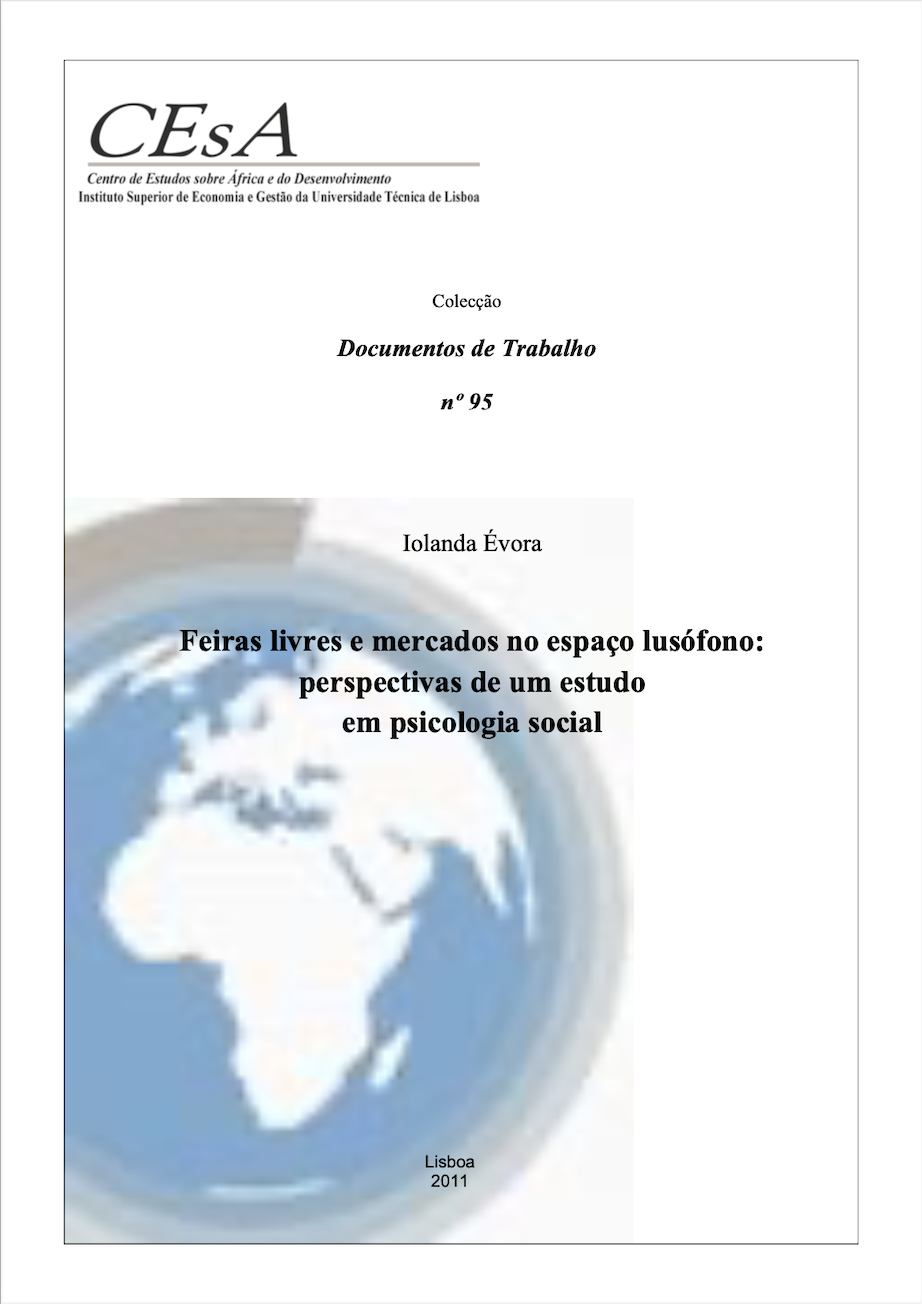
Working Paper 95/2011: Feiras Livres e Mercados no Espaço Lusófono: Perspectivas de um estudo em psicologia social
Abstract:
This communication proposes a reflection on the research methods to be applied in the study “Feiras Livres e Mercados no Espaço Lusófono: Perspectivas de um estudo em psicologia social”. The interest in the field is due, in the first place, to the type of study to be carried out and to the singularities of the proposed project, such as the fact that it will be carried out in the cities of Bissau, Praia and São Paulo, involving researchers from different areas of science and propose a field work with the subjects. Fairs and markets constitute the empirical objective of this study, presenting themselves as important universes of human activity and survival that mark the urbanity of capitals in the Portuguese-speaking space. The aim is to study the components and conditions for building a work base that will enable workers in markets and fairs to generate income through work in micro-enterprises. The study must identify and describe the material and psychosocial conditions that made it possible to become a worker in these free markets, building and acquiring the knowledge to be included in this work activity.
Quotation:
Évora, Iolanda. 2011. “Feiras Livres e Mercados no Espaço Lusófono: Perspectivas de um estudo em psicologia social”. Instituto Superior de Economia e Gestão – CEsA Documentos de Trabalho nº 95-2011.
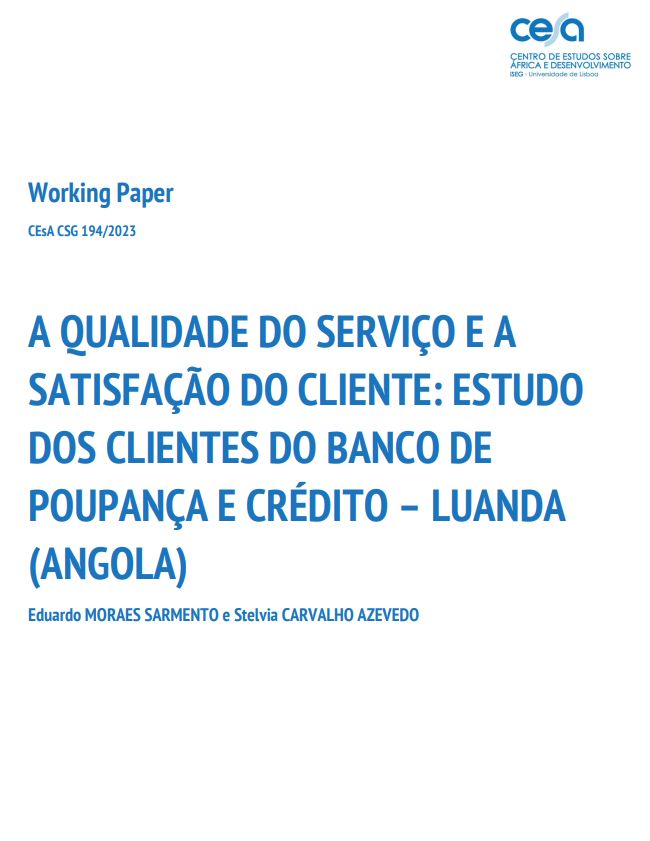
Working Paper 194/2023: A Qualidade do Serviço e a Satisfação do Cliente: Estudo dos Clientes do Banco de Poupança e Crédito – Luanda (Angola)
Abstract:
Nowadays, a correct and profitable way of managing the issue of service quality is to listen to customers, both satisfied and dissatisfied, to improve the information obtained, improve experiences with them and thus achieve greater levels of loyalty and, naturally, results. In this context, A Qualidade do Serviço e a Satisfação do Cliente: Estudo dos Clientes do Banco de Poupança e Crédito – Luanda (Angola) sought to assess the degree of customer satisfaction regarding the provision of the quality of services offered by Banco de Poupança e Crédito, located in Luanda (Angola) in order to identify the level of customer satisfaction according to the variables demographic and socioeconomic factors inherent to the SERVQUAL model and determine the correct methods and techniques for satisfaction, taking into account the elements of quality, in order to make the institution profitable. During this study, a structured interview was carried out for the Marketing and Communication Department and a questionnaire of 15 questions was applied, resulting in only 80 valid questionnaires out of 150. The same were applied during working hours to assess the quality of the service provided by the bank. From a modern company, as with the Bank, it is expected that its main objective is to provide customer satisfaction, indiscriminately needing all the company’s employees and for this it is necessary that they are satisfied to adopt attitudes consistent with this objective. However, managing these factors well to achieve positive results is an essential condition for the company to overcome the challenges.
Quotation:
Sarmento, E. M. e Azevedo, S. C. (2023). “A Qualidade do Serviço e a Satisfação do Cliente: Estudo dos Clientes do Banco de Poupança e Crédito – Luanda (Angola)”. Instituto Superior de Economia e Gestão – CEsA/CGS – Documentos de trabalho nº 194/2023
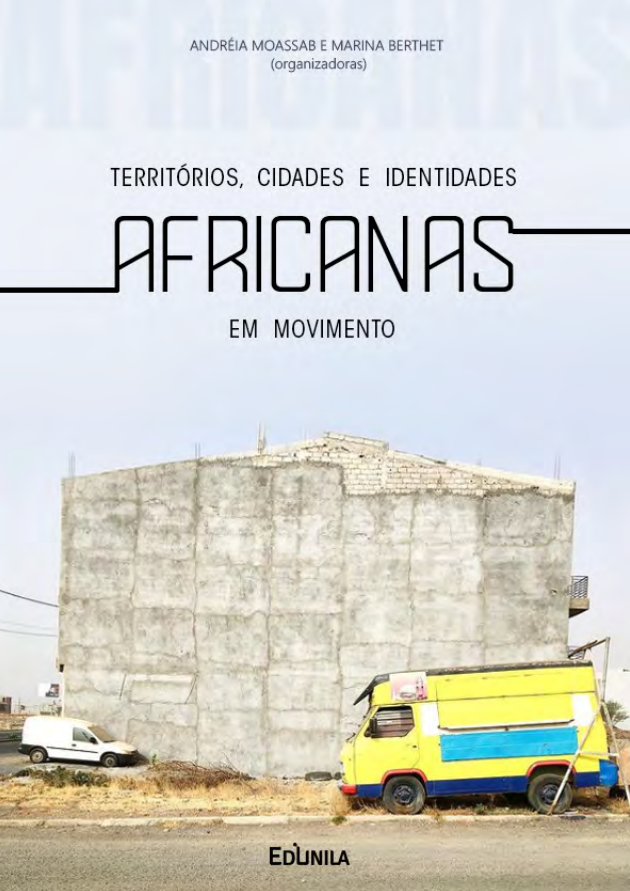
Hip-hop em Cabo Verde: rap e representação do espaço público na cidade da Praia
Abstract:
In Hip-hop em Cabo Verde: rap e representação do espaço público na cidade da Praia, the author studies how, despite the strong link with Portugal and the existence in that country of numerous rap groups composed of Cape Verdeans or descendants of Cape Verdeans, the hip-hop produced there is practically ignored and very little consumed by young people, particularly those from the periphery, to the detriment of the culture of North American black ghettos, known through the audiovisual flows of the digital era. Young people all over the world are seen as a risk factor, an association that is particularly patent in the modern discourse on security, especially in an era in which a part of young people associate themselves with street gangs, revealing “the failure of the expected reproduction of the support mechanisms of an expansive and optimistic capitalism”, which provides the so-called “Welfare State”. Thus, in the face of a feeling of juvenile unease, evidenced in some actions that destabilize the social order and the “Creole morabeza”, it becomes mandatory that the institutions that protect this population layer control them, reprogramming them institutionally, thus building a State Social Service.
Quotation:
Lima, R.W. (2022). Hip-hop em Cabo Verde: rap e representação do espaço público na cidade da Praia: In Territórios, cidades e identidades africanas em movimento. Andréia Moassab, Marina Berthet (Orgs.), 119-133. Foz do Iguaçu: EDUNILA, 2022. ISBN: 978-65-86342-32-1
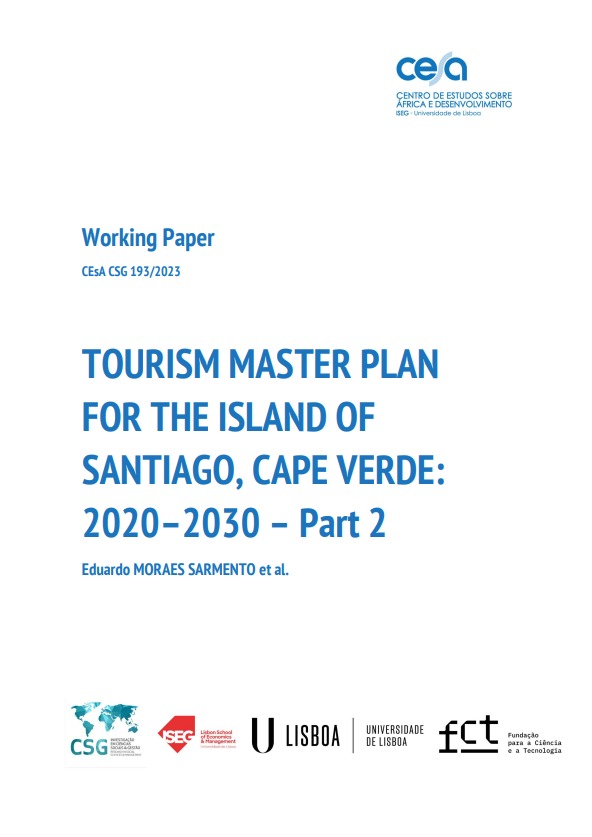
Working Paper 193/2023: Tourism Master Plan for the Island of Santiago, Cape Verde: 2020-2030 – Part 2
Abstract:
Cape Verde, a small insular development economy (SIDS), has been confronted and faces various economic, social and environmental constraints throughout its history that have been conditioning its growth strategy. In recent years, tourism has been growing and consolidating an important contribution to economic development, which is observable in the evolution of the number of nights spent in the country, revenue, number of guests, employment generation, and incentive to exports, among others. The gross added value of tourism currently has a weight that is already more than 20% of its GDP (excluding the COVID-19 pandemic period). Aware of this potential, the government created conditions for a greater use of its effects as a mobilizing factor in the economy, as reflected in various official supporting documents and strategic orientations, such as the Strategic Plan for Sustainable Development, and the Main Options of the Strategic Plan for Sustainable Development for the Tourism Activity. The Government decided that each island or region should develop its own strategic tourism plan (Masterplan). Tourism Master Plan For The Island Of Santiago, Cape Verde : 2020–2030 – Part 2 proposes several main strategic reflections about the Tourism Master Plan for the Island of Santiago in order to improve its competitiveness.
Quotation:
Sarmento, E. M. et al. (2023). “Tourism Master Plan For The Island Of Santiago, Cape Verde : 2020–2030 – Part 2”. Instituto Superior de Economia e Gestão – CEsA/CSG – Documentos de Trabalho nº 193/2023
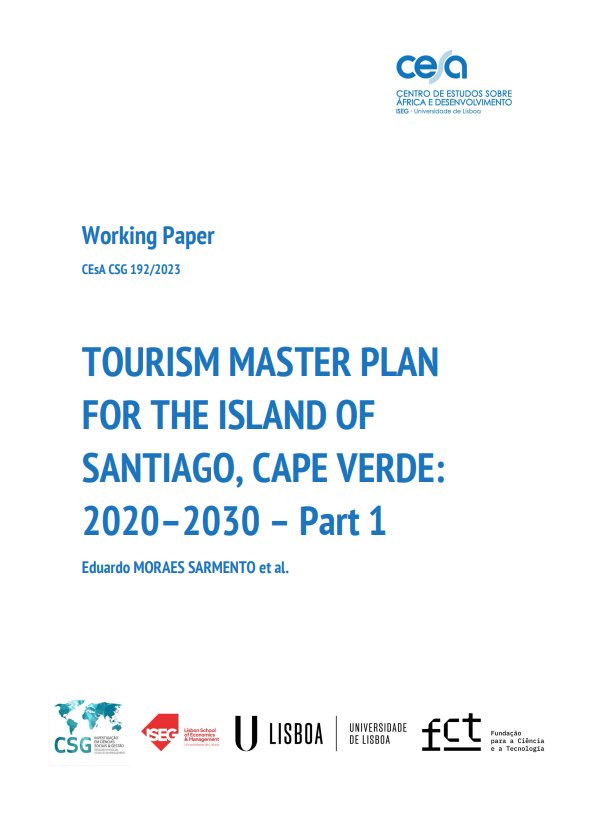
Working Paper 192/2023: Tourism Master Plan for the Island of Santiago, Cape Verde: 2020-2030 – Part 1
Abstract:
Cape Verde, a small insular development economy (SIDS), has been confronted and faces various economic, social and environmental constraints throughout its history that have been conditioning its growth strategy. In recent years, tourism has been growing and consolidating an important contribution to economic development, which is observable in the evolution of the number of nights spent in the country, revenue, number of guests, employment generation, and incentive to export among others. The gross added value of tourism currently has a weight that is already more than 20% of its GDP (excluding the COVID-19 pandemic period). Aware of this potential, the Government created conditions for a greater use of its effects as a mobilizing factor in the economy. Accordingly, various official supporting documents and strategic orientations have been approved, such as the Strategic Plan for Sustainable Development and the Main Options of the Strategic Plan for Sustainable Development for the Tourism Activity. It was also decided that each island or region should develop its own strategic tourism plan (Masterplan). Tourism Master Plan For The Island Of Santiago, Cape Verde: 2020–2030 – Part 1 integrates the main strategic reflections regarding the Tourism Master Plan for the Island of Santiago. Revenue from tourism on the Island of Santiago, where the capital of Cape Verde is located, has been much less than the values of the main islands with a high volume of tourists – Sal and Boa Vista. However, the potential of Santiago is high, and therefore it is necessary to adopt the correct measures required to transform this potential into reality. Therefore, this paper presents a short, medium and long-term vision, with a proposal for strategic objectives that will constitute the anchor on which all operational strategic and objectives that will translate into specific lines of action will be based. In summary, this document proposes a strategy based on a diversified and differentiated touristic offer from the other islands of the country, which maximises its potential, counteracting regional asymmetries and preserving the historical and intangible heritage, as well as the natural resources, with the aim for the whole population to benefit from the resultant economic development, especially the most disadvantaged.
Quotation:
Sarmento, E. M. et al. (2023). “Tourism Master Plan For The Island Of Santiago, Cape Verde: 2020–2030 – Part 1”. Instituto Superior de Economia e Gestão – CEsA/CSG – Documentos de Trabalho nº 192/2023
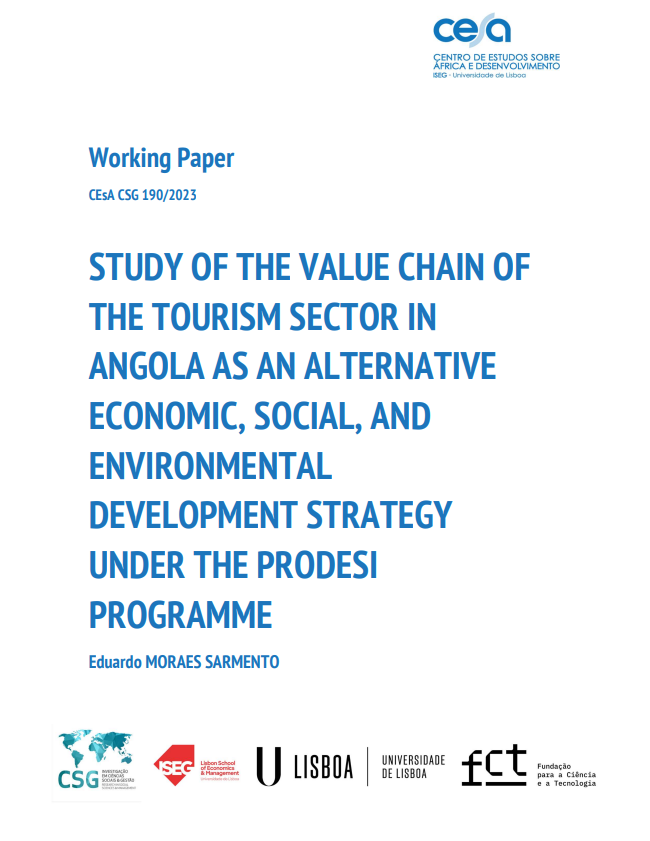
Working Paper 190/2023: Study of the value chain of the tourism sector in Angola as an alternative economic, social, and environmental development strategy under the Prodesi programme
Abstract:
Angola has been facing several economic and social problems, with one of the most important being related to the country’s long tradition of dependency on oil as a major external revenue. Due to this situation, the country’s income has been slowing and there is a need to find alternative strategies to increase the liquidity of the economy without which Angola would lack the necessary funds to increase investment and proceed with adequate policies to combat social exclusion and eradicate the flows of poverty. Aware of this situation, the government implemented the national PRODESI project, whose aim is to accelerate the process of the diversification of the nation’s economy. To this end, the project aims to promote production and exports in the non-oil sectors, as well as in sectors with a strong potential for import substitution. One of these areas is tourism, as a means of developing some of the country’s regions and provinces, and also in order to benefit populations living in worse conditions, whilst diversifying the economic restrictions. The focus of actions in PRODESI foresees that the to accelerate the diversification of the economy, whether through import substitution or through diversification and an increase in exports, will be directed towards the production of goods and services or the implementation of new strategies designed to gain critical mass and create intra and intersectoral relationships, such as in the case of tourism. Accordingly, the purpose of this research is to identify the main weaknesses of the core value chain of tourism and to propose a set of measures and recommendations to be implemented within the scope of PRODESI. The main objective is to ensure that this activity effectively contributes to diversifying Angola’s economy in a sustainable path and that it helps leverage the increase in national production in a faster and more efficient way and thus significantly help decrease the dependency on imports and increase the export basis, which can be achieved through adopting a strategy of diversification, based on both international and national tourism. 3 Methodologically, several studies were consulted and various meetings and in-depth field visits were made, between January and March 2000, in the provinces of Luanda, Malange, Huíla, and Namibe. Several interviews were carried out up until 2021with major players (ranging from ministers through to national directors and other experts) and tourist organizations (Ministries, Travel Agencies, and entrepreneurs). It is estimated that in the next 10 years Sub-Saharan Africa will register a growth in tourism superior to the global average, regardless of the COVID pandemic. Study of the Value Chain of the Tourism Sector in Angola as an Alternative Economic, Social, and Environmental Development Strategy Under the Prodesi Programme concluded that even though tourism in Angola still faces a deficit at several levels, the country nevertheless has a set of natural resources and tourism attributes that, if properly explored and used, could provide an alternative way for the future development of Angola’s society. Angola still faces residual tourism receipts from tourism activity as well as in total international incoming tourists, and therefore Angola’s national government may have a huge opportunity to implement a suitable tourism strategy (both for internal and external flows), in order to not only reinforce its importance but also to benefit the population, fight poverty, and diversify economic activities, as defined in the PRODESI strategy.
Quotation:
Sarmento, E.M. 2023. “Study of the Value Chain of the Tourism Sector in Angola as an Alternative Economic, Social, and Environmental Development Strategy Under the Prodesi Programme“. Instituto Superior de Economia e Gestão – CEsA/CSG – Documentos de Trabalho nº 190/2023





